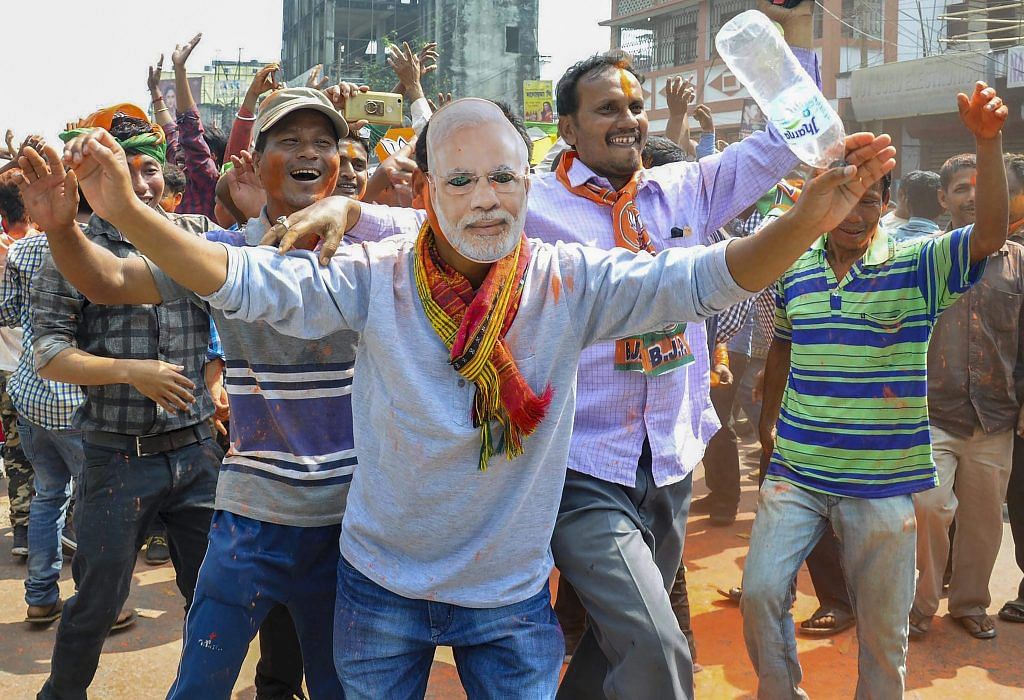Defeat in Tripura is payback for refusal to adapt to changing times, lack of introspection, petty internal rifts & inability to retain old base or capture new.
New Delhi: The BJP, an incumbent of 22 years in Gujarat, was brought down to a humbling 99 of 182 seats in the face of anti-incumbency, three social movements against it and an opposition Congress which anyway had a significant vote share of 40 per cent.
But it still managed to retain the state in December.
Contrast this with the Left in Tripura. The Left government, an incumbent of 25 years, was routed by a player that previously had less than 2 per cent vote share, to be reduced to an embarrassing 16 of 59 seats that went to the polls.
This analogy is just to prove that mere multiple term anti-incumbency cannot explain a party’s disastrous electoral outing in a state it rules and a state that has been its fortress, where it has deep, tentacled roots. Such a loss is a reflection of a much larger structural problem, a complete breakdown of the party’s electoral and political strategy and a massive disconnect with reality.
Its crushing defeat in Tripura is symptomatic of the much larger malaise that inflicts the Left – its near-complete electoral irrelevance. Absolute refusal to adapt to changing times, lack of any introspection, petty intra-party tussles and an inability to retain its old base or capture a new one. Combined with this, the CPI(M) – the dominant Left party – boasts of an arrogant leadership that believes this is the only party with an ideology and virtues and looks down upon others as being ‘compromised’ in one form or another.
Eroding relevance
The greatest problem for the Left is how it has failed to remain relevant to its existing vote base, while failing even more miserably in becoming an attractive option for the youth.
Anup Kumar Bhattacharjee, an MA history student of Tripura Central University in Agartala had said ahead of the elections it’s important for “Tripura to be on par with other states”. “Why just jobs, we need all-round development. As a young person, I don’t want a government that is stuck to theory like CPI(M) is to Marxism. Being practical is important,” he had said.
This very trait of the CPI(M) perhaps explains why the party is down to just 9 seats in the Lok Sabha from the 44 it won in 2004. It explains why in West Bengal, one of its former strongholds, the CPI(M)-led Left front had faced its worst defeat in the 2016 polls, with Mamata Banerjee’s Trinamool Congress winning 211 of the 294 seats. It explains why even in its only remaining bastion Kerala the party looks shaky.
Intra-, instead of inter-party politics
While it should be fighting the enemy outside, the party seems busy sorting out internal differences. The last time the CPI(M) hit the headlines was over the difference of opinion between party general secretary Sitaram Yechury and his predecessor Prakash Karat over the use of the phrase ‘understanding with Congress’ in its draft political resolution. Karat’s line, which ruled out any electoral alliance or understanding with the Congress, prevailed over Yechury’s, who did not want to rule out an understanding with the Congress.
The merits or demerits of their arguments aside, the party spent all its mental space in fighting over one document, even as a key election was close. Of course, anybody who tracks the party knows this document determines the party’s political course and is crucial to it, but the point is precisely that. The Left has failed to change itself as per altered socio-political and electoral circumstances where such outdated, dogmatic ways of determining a party’s course have been rendered redundant.
As the party, ridden by factionalism between what are known as the Bengal and Kerala units, fought over the word ‘understanding’, the people of Tripura seemed to have assumed that the CPI(M) was out of sync and unfit to rule.
It might take pride in its democratic structure but the truth is that at every step in the recent past, the CPI(M) has focussed more on fighting battles inside than outside.
Dogmatic, out of touch, leadership
It isn’t about Prakash Karat or Sitaram Yechury. The top leaderships of the Left parties are nothing but dogmatic and completely out of touch today. Comprising mostly of non-mass leaders, the leadership fails to identify electoral opportunities or weaknesses and reading public sentiment.
Manik Sarkar, who is one of their few mass leaders, too failed to read the public mood which yearned for change, which yearned for the kind of development and growth it saw in other states. The Left may want to believe that industries and growth are curses of ‘globalisation and neo-liberalism’, but the voters don’t.
The CPI(M)’s hypocrisy isn’t lost on its voters either. While it claims to stand for “people’s struggles”, its government employees in Tripura are paid as per the 4th Pay Commission when the rest of the country has moved on to the 7th Pay Commission.
To be sure, there is no denying that all parts of the spectrum complete a democracy and the Left is as important a part of the spectrum as the Right or the Centre. It, in fact, continues to remain an integral and balancing voice in Parliament.
But in its current form and set course, the Left in India is rapidly marching towards complete irrelevance, both electoral and political. The Tripura results on Saturday were nothing but a clear indication of that.
